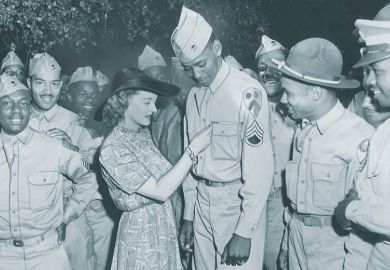Mamoun Hassan pays tribute to Britain's 'most thoughtful film director'.
One of the most powerful scenes in British cinema occurs in Lindsay Anderson's This Sporting Life . Richard Harris as rugby league player Frank Machin - hero on the pitch and in a tortured sexual relationship off it - sings deadpan in a northern nightclub: "Here in my heart I'm alone oh so lonely/Here in my heart I have room for you only."
Gavin Lambert's book about his friendship with Anderson illuminates, in a way that an academic analysis could not, why that scene is not sentimental and bathetic but raw and passionate. Apparently, Anderson, film director, theatre director, critic and writer, led a wholly celibate life. But this complex man, whom Lambert rightly describes as "the most original British film-maker of his generation", never gave the impression of being inhibited or in any way suppressed. Quite the contrary - he came across as confident, vivid, provocative and challenging. Perhaps we should have taken more notice of his nickname at the Royal Court Theatre: the "Virgin Queen". Anderson, like Lambert, was homosexual.
They knew each other from the time when they were schoolboys together at Cheltenham College, and their friendship survived Oxford, professional collaboration as joint editors of Sequence and separation when Lambert moved from the editorship of Sight and Sound to Los Angeles in 1956 to pursue a career as screen-writer and novelist. In writing this memoir, he had access to "painfully lucid" diaries that Anderson kept from 1942 to 1992 and a moving picture emerges of a man who never accepted his own sexuality. As a boy and in early manhood the subject of his passions were other homosexuals who rejected him; later, the love objects were heterosexuals (among them Serge Reggiani, star of the French classic Casque d'Or , Richard Harris and the actor Frank Grimes) with whom a sexual relationship was impossible.
The book's title is an echo of Anderson's wonderful and definitive About John Ford, a book that is as much about Anderson as about Ford. Lambert calls his book a "biographical-autobiographical-monographical memoir", and it tells us quite a lot about Lambert. In the early part of the book, this mixture is enriching, as it highlights the contrast between Lambert's ease and Anderson's fierce control. At Oxford, while Anderson agonised, Lambert had a relationship with fellow student Peter Brook ("He disappeared to the bedroom... and returned wearing an impressive silk dressing-gown, and placed a record of Chopin Nocturnes on the gramophone. Then he asked, 'Do you mind if I seduce you? '"). While Anderson is drafted, Lambert gives a hilarious account of avoiding the draft by painting his eyelids gold for his military board (he was classified as unfit to serve). Later, Lambert had a relationship with the great Hollywood director Nicholas Ray, which was what took him to Hollywood. Beyond that, his own story is not compelling: the writing, which is lucid, witty and precise about Anderson, loses detail when about himself. Often I wanted him to return to the main story.
Every time he does, it seems that Anderson is preparing for the same thing: the next round, the next battle. In This Sporting Life , Machin, before he joins the team, picks a fight with the captain who is celebrating at a night club. The scene cuts directly to the street outside with Machin throwing a punch at and past the camera. He floors the captain,then the man next to him, then scuffles with another. He is held back. The bystanders are stunned and uncomprehending. "What's all this about then?" one of them asks, as if there could be a simple answer. Anderson understood that punch. He was angry with England and enraged with British cinema. And he took them on.
After serving in India during the war, and returning to Oxford to graduate, he was offered the chance to make documentaries in Yorkshire. Hardly a "break", but he made it into one. For five years, off and on, he learned his craft. He became a brilliant editor and one of the most imaginative users of sound (listen to the public-school world evoked behind the opening titles of If ..., and the Congolese Missa Luba ). He found northerners congenial. They gave him the background and insight he later used to such effect.
At the same time, he edited Sequence until its demise in 1952, with Lambert as co-editor for much of the time. Sequence is interred with its bones but at the time it influenced a whole generation. Anderson and his colleagues demolished the distinction between popular and art cinema, proposed the idea of the director as the maker of the film, and wrote in a new and concrete way far removed from the journalistic and theoretical writing of the time. Popular genres - westerns, musicals and Hollywood noir -were analysed and their directors accorded the status of artists. Across the Channel, from 1951, Cahiers du Cinema , led by Francois Truffaut and Jean-Luc Godard, pursued related aims in parallel, although with a Gallic flavour and more entrenched theory. Anderson said of the Cahiers crowd, "I picture them at some café on the Left Bank talking at each other". Some of the ideas in Sequence have become the common currency of film appreciation.
Anderson's criticism of British cinema up to the 1950s was almost like a blood sport. British film-makers had a "dislike of reality" and were emotionally anaemic ("when emotion threatens, make your characters talk about something else in a little, uncertain, high-pitched voice"). Although he and Lambert admired the subversiveness of Robert Hamer ( Kind Hearts and Coronets ) and Alexander Mackendrick ( Whisky Galore!, The Man in the White Suit, The Ladykillers ), both he and Lambert derided much of politer Ealing: in Sequence , Anderson demolished Scott of the Antarctic , while Lambert captioned an accompanying still "The Frozen Limit". "The way it is said, is the thing said," he commented. His writing had a directness and verve that made him one of Britain's best critics. And his one-liners could be tart: "A chocolate-box war" for The Bridge on the River Kwai ; "Apt title for an English film" for Don't Look Now; "A compassionate film for the cold-hearted" for The Killing Fields .
Critics were part of the problem of the British film, said Anderson. He castigated them for "artistic patriotism" in over-praising the "second rate". "By celebrating the merits of the trivial, (they) lower the prestige of cinema, and indirectly, make it more difficult for anyone to make a good film." Some things don't change. Lambert turned Sight and Sound from being "terminally boring" into the world's leading film magazine. Today it has declined into an up-market satellite of Showbiz, its deputy editor solemnly telling a television interviewer that Helena Bonham Carter's fee would go up if she won an Oscar.
In writing for Sequence , Anderson "discovered the angle at which he stood to the universe", writes Lambert. In response to a review that yearned for a cinema that was "warm, vague, extravagant and sentimental", Anderson wrote his most startling piece, "Stand up! Stand up!", for Sight and Sound : a clarion call for "committed" and "personal" cinema. "Personal" was an important word for Anderson, as were "poet" and "poetic". John Ford was a poet; Humphrey Jennings, the documentarist, was the "only real poet of British cinema"; so, later, was Bill Douglas. Sometimes Anderson was a poet, and other times he strove too hard to be one.
Although Anderson ended his life a loner, Lambert reminds us that for much of it he was at the centre of things. In the theatre he was integral to the revolution at the Royal Court when the English Stage Company - George Devine, Tony Richardson and Oscar Lewenstein - put on Look Back in Anger and the ground-breaking plays that followed. Anderson's productions of Willis Hall's The Long and the Short and the Tall , John Arden's Sergeant Musgrave's Dance and the David Storey plays, including In Celebration, The Contractor and Home (with John Gielgud and Ralph Richardson) are memorable for their classic restraint. His theatre style contrasted with his work in the cinema, where he was exuberant and loud, sometimes to the point of hectoring; in theatre he spoke more softly. Maybe there was less at stake. However, the theatre kept him mentally alive during the years of waiting between films.
Tony Richardson also figures, with Karel Reisz, in the collaboration of "Free Cinema". The title was invented by Anderson to bring together and justify a season of shorts at the National Film Theatre. The films - including Richardson and Reisz's Momma Don't Allow , Anderson's O Dreamland and Lorenza Mazzetti's Together , which Anderson edited - have been mostly forgotten. But Free Cinema, the movement, still has resonance. Its manifesto, written by Anderson and signed by all of them, is poetic in tone but the intention is not dissimilar to that of postwar Italian neo-realism ( Bicycle Thieves ), namely the pursuit of "reality". Free Cinema inspirits This Sporting Life and Saturday Night and Sunday Morning, A Taste of Honey , and The Loneliness of the Long Distance Runner . These films gave the complacent industry a shaking. Ken Loach, Bill Forysth, Bill Douglas and Mike Leigh are inheritors of that spirit.
Lambert's description of the production of the major Anderson films is brilliant, and so is his assessment of them. Every word counts. There were few films and most were hedged with controversy: This Sporting Life, The White Bus, If..., O Lucky Man, In Celebration, The Old Crowd, Britannia Hospital and The Whales of August . Of the films that set Anderson on his lonely course, Lambert rates O Lucky Man highly, and almost raves about Britannia Hospital , which, nearly 20 years later, still inspires particular loathing. References to it pepper the book. He says EMI financed the film using some spare cash that had to be spent for tax reasons. In fact, EMI would not have committed had not the National Film Finance Corporation, which I ran at the time, committed first. In the industry way, EMI wanted a backup, someone to blame. There was little support for it on my board, either before or after, and I had to refer it to them twice before they finally acquiesced.
Maybe Lambert is right that the hostility to both films is due to Anderson holding up "a devastating mirror-image to Britain". But there is a problem with "the way it is said". The Brechtian alienating device adopted to make the audience "think" is difficult enough (how many films in that style have succeeded?) but the internal rhythm is not consistently dynamic. Swiftness of attack was called for. The dash, so evident in This Sporting Life , is not always there. The audience is given too much time to think, and not in the way the director intended. In If ..., by contrast, all the elements, personal and poetic, come together to create a masterpiece.
The boy who wrote "I REBEL" on the school blackboard grew up to wage cultural war - and to rebel against himself. In 1948, when he was 25, he wondered about his future: "a celibate life, sexual frustration compensated by friendship, activity, creation?" Lambert never lets you forget "sexual frustration"; he is very strong on "creation"; but he is light on "activity", on his old friend's championing of young talent and on his friendships and contacts with directors worldwide. Lindsay Anderson had an enormous influence, even on those who did not like him or his work. He dignified cinema.
He was the most thoughtful film-maker Britain has ever had. He wanted to think through, in private, in public, in print, on film, what films we should be making and how. Today there is a lot of talk about the need for "good" films. "Good" means those that make money; films that make money are "good": there is no place for thought.
I miss Lindsay. I miss the old bastard. We need him now.
Mamoun Hassan is head of editing, International Film and Television School, Cuba. From 1979-84, he was managing director, National Film Finance Corporation, UK. He is currently producing a film for Bill Forsyth.
Mainly about Lindsay Anderson: A Memoir
Author - Gavin Lambert
ISBN - 0 571 17775 1
Publisher - Faber
Price - £18.99
Pages - 302
Register to continue
Why register?
- Registration is free and only takes a moment
- Once registered, you can read 3 articles a month
- Sign up for our newsletter
Subscribe
Or subscribe for unlimited access to:
- Unlimited access to news, views, insights & reviews
- Digital editions
- Digital access to THE’s university and college rankings analysis
Already registered or a current subscriber? Login



